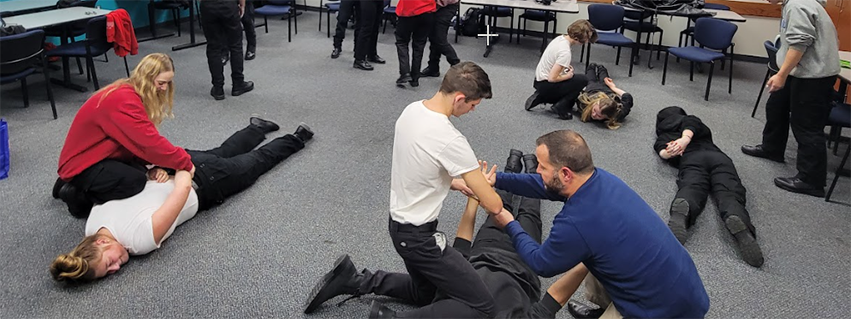
Law Enforcement
This program is offered to juniors and seniors. It explores the basic concepts and potential career opportunities in Law Enforcement. Students will be exposed to concepts and theories of patrol and the delivery of police services. A career in law enforcement requires you to read, understand criminal laws and write reports. A typical week will involve classroom instruction, physical fitness which requires participation and hands-on policing activities. These drills are designed to develop character, confidence and leadership skills. Students will practice the Michigan Commission on Law Enforcement Standards (MCOLES) physical test that is required when a person wants to attend a police academy.
Program Overview
Course Information
Program Location
LCC West Campus
Session Offered
PM
Average Lecture days/week
2-3 days
Average Lab days/week
2-3 days
Homework
Daily
Required Reading
- College level textbooks
- Manuals
- Less than 25 pages per week
Success Indicators
- Observant
- Strong researcher and writer
- Detail oriented
- Enjoy gathering and interviewing
- Interest in enforcing rules
- Sound judgment
College Credits - 10
- CJUS 101 - Introduction to Criminal Justice
- CJUS 104 - Theory of Patrol
- CJUS 204 - Criminal Investigation
Academic Rigor
4 out of 5
Capital Region Technical Early College
Students enrolled in this program may choose to participate in the Capital Region Technical Early College program. It is a high school-to-college program where students start in grade 11 and leave in grade 13 with a college degree or certification. The program gives students relevant career-related experiences.
Course Outcomes
Students learning outcomes include, but are not limited to:
- Explain and identify three components of the Criminal Justice system and its historical context
- Explain the functions and roles of policing in the Criminal Justice system
- Identify and discuss the functions of the court system and analyze the corrections system
- Define, explain and compare current issues within the Criminal Justice system and how they impact society
- Compare and contrast the advantages and disadvantages of alternative patrol strategies
- Prioritize the delivery of police services
- Explain and apply the problem-solving approach to policing
- Explain and demonstrate the process and techniques of crime scene investigation
- Explain and discuss the specific roles and responsibilities of the first responder and investigator at crime scenes
- Identify the value of physical evidence found at crime scenes
Certifications
- CPR/First AID
- FEMA 100
Student Leadership
Students have the opportunity for leadership, competition and community service through membership in SkillsUSA.
Career Outlook
Careers
- Police/Sheriff Patrol Officer
- Identification/Records Officer
- Forensic Science Technician
- Detective/Criminal Investigator
- Customs & Border Protection Officer
Median Wage
- Police/Sheriff Patrol Officer: $34.75 Hourly, $72,280 Annually
- Identification/Records Officer: $43.80 Hourly, $91,100 Annually
- Forensic Science Technician: $31.22 Hourly, $64,940 Annually
- Detective/Criminal Investigator: $43.80 Hourly, $91,100 Annually
- Customs & Border Protection Officer: $34.75 Hourly, $72,280 Annually
Employment Outlook (Average)
- Police/Sheriff Patrol Officer: 2-4%
- Identification/Records Officer: 2-4%
- Forensic Science Technician: 9%
- Detective/Criminal Investigator: 2-4%
- Customs & Border Protection Officer: 2-4%

